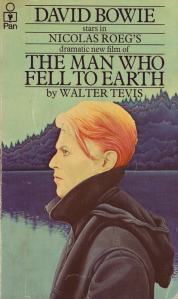I am not a fan of sci-fi: never have been and probably never will be. Or so I thought.
Like every other boy of the 1970’s I loved love ‘Star Wars’ but it wasn’t until the early 80’s with the BBC’s adaptation of ‘The Day of theTriffids’, and then ‘Threads’ did a certain breed sci-fi come to affect my whole outlook on life. Frankly, at the time I thought we were doomed. Borne of these are the beginnings of a political awakening that took another decade to bear fruit.
Both were imaginings of terrible fictions. ‘Threads’ seemed all too real and hypothesized nuclear Armageddon, whereas the BBC’s updating of the John Wyndham’s novel presented a different side to social destruction –giant, man-killing plant aliens. The genre was known as post-apocalyptic, and is an awkward addendum to sci-fi genre. They were fictions based on supposedly scientific possibilities. Indeed, ‘Threads’ was the first mass understanding of the nuclear winter hypothesis which was a debate still raging at the time – making even surviving a nuclear holocaust so terrible as to warrant questioning the point of living.
But I was slightly too young to remember the silent killer at work in the BBC’s 1970’s post-apocalyptic series ‘Survivors’.
This time it was an invisible means of destruction: disease. Watching the 70’s series on DVD today, I can see now that had I been just a bit older when it aired, it would have marked me as indelibly as ‘Threads’ would later in the 80’s.
Written by TV sci-fi supremo Terry Nation (who also gave us Blake’s 7 and many a Dr. Who storyline) it supposes the very real threat of a deadly epidemic and the social decay and terrible anarchy that arises out of the entire destruction of the state. These are topics I have written about before in The Clarion with my review of ‘The Death of Grass’ (by John Christopher) and to a degree in my explorations of modern utopian writing (all share communes and different social codes among their defining features). Nation, however, was at pains to distance his new series from his sci-fi work stating that “Survivors has its roots in the future, as it were, but it’s not science-fiction. It’s not going into the realms of the impossible; it’s skating very close to the possible,” which I guess is why the series still holds my interest, despite Nation’s other portfolio.
Indeed, the Radio Times write-up for ‘Survivors’ (it was shown on BBC1 over 3 series from 1975) cites a line from the show which sums up perfectly its preoccupation: “Incredible, isn’t it? We are of the generation that landed a man on the moon and the best we can do is talk of making tools from stone.”
‘Survivors’ is at its best when it questions our assumptions about how stable our society really is. How civil we might truly be under great duress, and what happens when we peel away the froth of our consumerist lives? It pokes around in moral dilemmas not usually broadcast in BBC dramas at 8pm on a Wednesday night. Today or in the 70’s.

- Jenny, Abby & Greg (L to R). The face Jenny is pulling is because they’ve just found the body of a man hanged for looting a supermarket.
Lucy Fleming is the likeable constant, but where as heroine ofseries one (Carolyn Seymour as Abby Grant) is admirably driven she remains fairly impenetrable and one dimensional. What is to be commended, particularly for the age – as this still happens too infrequently today – is that the producers accepted a female as the lead character in what was on the face of it an adventure series. Granted, ‘Charlie’s Angels’ was also around at the same time, but they were impeccably hair-sprayed icons drawn by men of what women heroes ought to be like (and with a male for their boss, no less). Even ‘Wonderwoman’ was busty and pouted silky lip-gloss. By contrast Abby Grant crops her hair as she sets out on the road into a post-apocalyptic British countryside, her dead husband sprayed across the lounge sofa.
The camera follows Abby in what could easily have turned outto be classic Twilight Zone territory (“Oh God, please don’t let me be the only one.”) only to reveal to the audience the parallel story of Jenny Richards (Fleming) and then separately again the incredibly annoying Jackanory-esque tramp-comes-good storyline of Tom Price (played in a ridiculously Dickensian turn by Talfryn Thomas). But once modern viewers adjust their grins at the tragic fashion and 70’s BBC acting, the strength of the stories and other characters comes to the fore.
My favourite, for example is that of super-bitch Anne Tranter and Vic who she leaves for dead in a quarry once she realises he cannot supply her with riches now that he’s tragically crippled by an accident. Then there’s the poetic child-killer in series two and capital punishment episode in series one, both of which feel like Amnesty International had a hand in the writing.
Of course, one of the recurring themes is the nature of community and the role of leadership, be it within our ragtag group or across the other surviving communities and bandits the characters stumble across. Alongside this is the pressure that “Our civilisation had the technology to land a man on the moon, but as individuals we don’t even have the skill to makean iron spearhead”. The realisation that scavenging will only last so long comes to the fore and without a sign of a state forming any time soon, there’sa quick return to self-sufficient agriculture, with all its pitfalls and trials. This is not ‘The Good Life’.
Upon completing production of the pilot episode, contracts were drawn up in January 1974 and the show commissioned around the theme: ‘Bubonic plagues sweeps the world, killing all but a handful of people who escape to the country with absolutely nothing and who start civilisation again from scratch.’ But the response to Nation’s series was mixed.
The Times was expecting classic sci-fi in the Dr. Who mould from Nation and was therefore rightly disappointed. The Guardian for its part was just underwhelmed (‘a perfectly passable pastime’). The Daily Mail, however,got it on the nail when it compared its greatest strength to HG Wells’ War ofthe Worlds in which ‘extraordinary events are set in actual, small-scale landscapes’ – which is why the work reminded me of ‘The Death of Grass’ (and toa degree, John Wyndham’s ‘The Midwich Cuckoos’) – all of which seem set in a comfy version of the British countryside which we’ve come to love through thelikes of Betjemen, the Hovis ad or ‘All Creatures Great and Small’. And that is why so much of it is so simple yet effective.
Some of this is owed to the ‘feel’ of the work. While the opening title theme is infectious (ahem) and the titles sequence explains all we need to know about the origin and spread of the disease, it is interesting to note that it wasn’t a clever directorial instruction to omit incidental music, but a BBC strike, which lead to a very tight production schedule and hence no budget or time for music. This probably inadvertently adds much to the silence of dead Britain. It obviously works, because there’s still no incidental music by the end of the final third series.
It is also with some interest then that I discovered that much of the farm the group settles in during series two is not far from Monmouth. In fact, there’s quite a local link. Series one saw shoots in Evesham, the Pitville Circus in Cheltenham, various locations around Ross-on-Wye, Llanarth Court in Monmouth but was mostly shot in Herefordshire’s Hampton Court. By series two Callow Hill Farm near Monmouth came the setting for the fixed commune.
Alan W. Turner’s biography of Nation lays the departure of the shows’ creator to a split with co-writer Jack Ronder. The two had differences over the series’ direction and once Nation had also fallen out with the producer, Nation withdrew from his own project altogether. Besides, by this point Brian Clemens, who Nation had worked with on shows like ‘The Avengers’, filed court proceedings stipulating ‘Survivors’ was his idea in the first place’. The project seemed diseased on every level.
Somehow it survived. A second series was commissioned and Nation penned a novelisation of his version of the story – now a collectors’ item. For TV, Series two (1976) sees the departure of Abby Grant and a change of setting and I think it is all the better for it. It does suffer from the problem in TV series where one remarkable thing has to happen after another for fear of losing audience interest (but that could also be said of ‘The Archers’, albeit on a slightly smaller scale and perhaps less deadly). This sadly misses the point, of course, that ordinary post-apocalyptic life had itself WAS extraordinary to us viewers watching from the lap of technological luxury and leisure.
Series three took the show to its conclusion (1977). It still had the essence of what Turner commented was Nation’s premise, a “western, the struggle against nature and the attempt to establish a morality in a lawless land.” But now it was more about adventure than character and smaller domestic struggles. Eventually, the search for engineer Greg Preston becomes more than annoying and dampens the effect of the ‘Survivors’ as a whole.
Of course ‘Survivors’ received the inevitable modern BBC remake. And like many updates it revels in sensation, where remarkable things have to be so exciting and bombastic as to be inane. Zombie-apocalypse movies and video games are now ten a penny and with them, the danger of something as benign as a disease just doesn’t cut it anymore.
In many ways, however, the real world is more frightening. Remember BSE, driving past foot-and-mouths bonfires, bird-flu? And the impending influenza epidemic we’re due?
Yes, ‘Survivors’ is old-fashioned. But it is a unique piece of British TV history, trapped in time in this vast DVD box set.

SOURCES: ‘Survivors’ the complete series on DVD; ‘The ManWho Invented the Daleks: the strange worlds of Terry Nation’ by A. W. Turner(Aurum Press, 2011); http://survivors-mad-dog.org.uk/
 Throughout her life she fought continuously for justice and human rights in the name of the voiceless and the poor of the world.
Throughout her life she fought continuously for justice and human rights in the name of the voiceless and the poor of the world.




